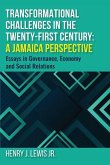Jamaica seems more poised on the edge of being labeled a failed State rather than on the brink of being labeled a successful nation. It is a country that continues to struggle in its attempts to move away from a past and a present marred by economic crisis. It is a country whose politics continue to shape the environment in which educational organizations operate. These challenges, coupled with increased scope and speed of globalization and technological advancements have contributed to the creation of an education sector that is not viable for sustaining the economy. In order to combat these challenges, leaders and stakeholders in the educational arena should develop skills that will equip them to gain a better understanding of the cultural, technological and political factors shaping their environment. Once this step is completed it will be necessary to identify and implement techniques that will assist in creating organizations capable of generating human capital as well as preparing citizens to function in a globally competitive environment. This manuscript offers an assessment of some of the factors affecting educational organizations in Jamaica. It looks at the impact of these factors on the education process and identifies a seven step approach that leaders can utilize to assist in creating and maintaining organizations that are more conducive to the needs of contemporary and future Jamaica. The seven step approach is based on theory as well as an analysis of techniques used by countries such as Barbados and Singapore; countries that bear marked similarities to Jamaica in economic, political, colonial and educational struggles, but have managed to create an educational system that seems to be more effective in responding to the demands of the 21st century. The seven techniques are: (1) Recognize the need for change (2) Incorporate leadership (3) Embrace creativity and innovation (4) Utilization of scenario planning (5) Promote rest and renewal (6) Encourage s
Hinweis: Dieser Artikel kann nur an eine deutsche Lieferadresse ausgeliefert werden.
Hinweis: Dieser Artikel kann nur an eine deutsche Lieferadresse ausgeliefert werden.








